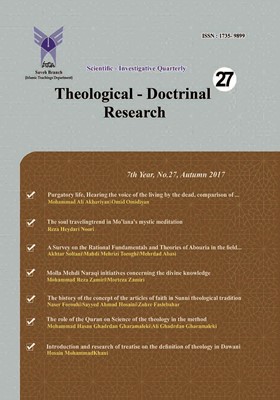Purgatory life, Hearing the voice of the living by the dead, comparison of opinions of Ibn Taymiyyah and Ibn Qayyim al-Jawziyya with the viewpoint of Wahhabism
Subject Areas : Islamic theology
1 -
2 -
Keywords: Purgatory life, Hearing the voice of the living by the dead, Ibn Taymiyyah , Ibn Qayyim , Wahhabism,
Abstract :
Purgatory life and related issues are linked with some Islamic traditions like Tawassul, Supplication from the souls of the righteous, and Visiting the graves. With emphasizing Purgatory life of the dead, majority of Muslims also accept Hearing the voice of the living by the dead that is the base for Tawassul and supplication from the souls of the righteous. Similar opinions of Ibn Taymiyah and Wahhabism in opposition to Tawassul and supplication, are associated with Consensus of Wahhabism and its predecessors about Purgatory life. But after analysis of opinions of Ibn Taymiyyah and Ibn Qayyim on one hand, and Wahhabism on the other hand we see a clear difference of opinions about Purgatory life and related issues such as Hearing the voice of the living by the dead. Ibn Taymiyyah in brief, and Ibn Qayyim in detail believe in Purgatory life and Hearing the voice of the living by the dead. However Wahhabism believes in limited Purgatory life and considers Not to Hear the voice of the living by the dead as the main principle. So this question remains; How Wahhabism claims to follow Ibn Taymiyyah and Ibn Qayyim about the issues of Purgatory life and Hearing the voice of the living by the dead, and how Wahhabism goes beyond its predecessors and disagrees with the majority of Muslims about these issues, and even disagrees with its Sheikhs.
1) قرآن کریم.
2) ابن تیمیه، احمدبن عبدالحلیم (1408 ق)، الفتاوی الکبری، عبدالقادر عطا، دار الکتب العلمیه، بیروت.
3) ابن تیمیه، احمدبن عبدالحلیم (1416 ق)، مجموع الفتاوی، تحقیق: عبد الرحمن بن محمد بن قاسم، مجمع الملك فهد لطباعة المصحف الشريف، المدينة النبوية.
4) ابن حنبل شیبانی، احمد بن محمد (2008 م)، مسند الإمام أحمد بن حنبل، تحقیق: محمد عبدالقادر عطا، دار الکتب العلمیه، بیروت.
5) ابن فارس، احمد (1404)، معجم مقاییس اللغة، عبدالسلام محمد هارون، مکتبة الاعلام الاسلامی، قم.
6) ابن قیم، محمد بن ابی بکر (1402 ق)، الروح، تحقیق: محمد اسکندر یلدا، دار الکتب العلمیه، بیروت.
7) ابن منظور، محمد بن مکرم (1426 ق)، لسان العرب، دار الکتب العلمیة، بیروت.
8) آلوسی، نعمان بن محمود (1425 ق)، الآيات البينات في عدم سماع الأموات عند الحنفية السادات، تعلیق: محمدناصر الدين الالباني، مکتبه المعارف، ریاض.
9) بخاري، محمد بن إسماعيل (1423 ق)، صحيح البخاري، دار ابن کثیر، دمشق.
10) بن باز، عبدالعزیز (1420 ق)، مجموع فتاوی و مقالات متنوعه، جمع: محمد بن سعید الشویعر، ادازه بحوث علمیه و الافتاء، ریاض.
11) جرجانی، علی بن محمد (1411 ق)، التعریفات، محمدبن عبدالحکیم القاضی، دارالکتاب المصری، قاهره.
12) راغب اصفهانی، حسین بن محمد (1416 ق)، مفردات الفاظ القرآن، تحقیق: صفوان عدنان داوودی، ذوی القربی، قم.
13) رضوانی، علی اصغر (1390 ش)، وهابیت و عالم برزخ، مشعر، تهران.
14) زاهدی، سعید (1391 ش)، ماضي استمراري؛ سلفی گری در جهان اسلام از وهابيت تا القاعده، عابد، تهران
15) سبحانی، جعفر (1432 ق)، ابن تیمیه فکرا و منهجا، موسسه الامام الصادق (ع)، قم

